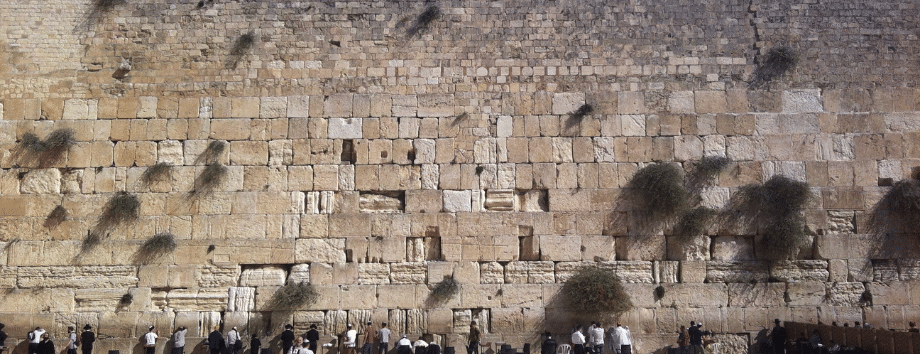Tisha B’Av: A Day of Reflection, Mourning and Hope
July 23, 2024 | Jewish Traditions and Values

By Rachel Turniansky
Tisha B’Av (Tisha = the 9th day of the Hebrew month), of Av which falls out this year on August 12 – 13, 2024, is considered the saddest day of the Jewish calendar, as we remember the destruction of the First and Second Temples in Jerusalem. But did you know there’s so much more to this day than just these events? Tisha B’Av also marks a series of significant challenging moments in Jewish history. This day of fasting gives us a chance to reflect on some lesser-known stories and how these past events have shaped our community’s strength and resilience. Here we share some more fascinating insights on Tisha B’Av.
Commemorating Destruction, Embracing Reflection
Marked by fasting and introspection, Tisha B’Av primarily commemorates the destruction of the First and Second Temples in Jerusalem. These Temples were the centerpiece of Jewish life and worship in ancient Israel, so their loss symbolizes much more than physical destruction, it represents the loss of national sovereignty, cultural devastation and exile. The First Temple, built by King Solomon, was destroyed by the Babylonians in 586 BCE. The Second Temple fell to the Romans in 70 CE after a prolonged siege of Jerusalem. Today, the Kotel, or Western Wall, in Israel is the only remaining visible part of the site. It’s actually part of the Temple Mount retaining wall that once surrounded the Temple itself.
While Tisha B’Av commemorates ancient tragedies, it also serves as a reminder of ongoing challenges and injustices faced by Jewish communities worldwide, like the expulsion from Spain in 1492 and the start of World War I in 1914. This day prompts introspection about the causes of division, suffering and the quest for spiritual and communal healing.
Observing Tisha B’Av with Practices of Mourning
The day is observed with various practices that reflect mourning and repentance.
- Fasting: Observers abstain from food and drink for approximately 25 hours, starting at sundown the evening before and concluding at nightfall the following day.
- Reading of Eicha (Lamentations): The Book of Lamentations, attributed to the prophet Jeremiah, is readon the eve of Tisha B’Av and during the day in synagogues or at home. The book mourns the destruction of Jerusalem and the suffering of the Jewish people.
- Restrictions: Similar to Yom Kippur, Tisha B’Av is a day of solitude and refraining from joyous activities like bathing, applying lotions or perfumes and marital relations. Many people also avoid simple pleasures like listening to music and they’ll sit on the floor or low chairs as a sign of mourning.
- Reflection: Many spend the day praying, learning texts that relate to the themes of destruction and exile and contemplating the lessons of Jewish history.
A Festival of Reflection and Renewal
Even in the face of its somber nature, Tisha B’Av carries a message of hope and resilience. In Hebrew, it’s known as a moed, which means festival, despite the focus of the day being on communal tragedies. We are encouraged to strive for a better future, characterized by peace, justice and unity. Communities often gather to discuss ways of tikkun olam, repairing the world, and building a society rooted in compassion and understanding. We also rejoice in the fact that the Nation of Israel survived and continues to survive as a “people”, despite our spiritual home and geographical nation being destroyed.
Finding Relevance in Tisha B’Av Today
For some people, it can be difficult to feel the relevance of Tisha B’av and mourning something that has been gone for so long. Here are some suggestions on ways to connect to this ancient event.
- Most larger cities have Jewish learning opportunities, either in person or online. If you’re more interested in exploring on your own, you could search online for Jewish learning videos or a podcast with a Jewish theme.
- Think about those in need and look for ways to volunteer in honor of the day.
- Spend some time speaking with relatives to better understand your family’s history and possible struggles or obstacles they had to overcome as Jews.
Our Hope for the Future
Many Jews hope to one day come together and see a rebuilt Holy Temple. There is a belief that this occurrence will truly unify the Jewish people. At a time in our history when we are again facing a great deal of destruction and division, both physically and metaphysically, it’s more important than ever to reflect and remember that while Jerusalem is, in many ways, rebuilt, we still need to find a way to unify. It’s said that every Mitzvah, good deed, adds a brick to the Holy Temple. May we all experience the joy of a vibrant, cohesive Jewish community from wherever we are.